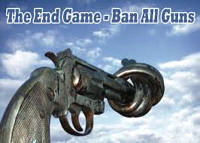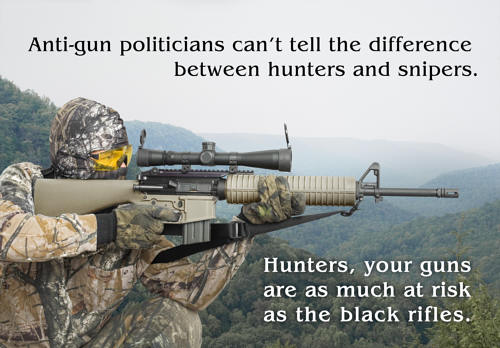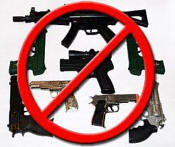

"Progressive" Writer Blames "Arsenal Owners"
for Blocking Onerous Gun Laws
![]()
By Kurt Hofmann, March 25th 2015
JPFO writer contributor, © 2014.
 It has become popular among supporters of oppressive "gun control" to point to a notional marked, sustained decline in private gun ownership in the U.S. This, in turn, supposedly means that now is the time for the gun ban zealots to strike, because the numbers are not on gun owners' side.
It has become popular among supporters of oppressive "gun control" to point to a notional marked, sustained decline in private gun ownership in the U.S. This, in turn, supposedly means that now is the time for the gun ban zealots to strike, because the numbers are not on gun owners' side.
They immediately run into some problems with this assertion, because the number of privately owned guns has been increasing, sometimes quite dramatically, year after year. So to reconcile the claim of declining gun ownership, with the fact of soaring numbers of privately owned guns, they resort to the contention that "more and more guns are owned by fewer and fewer people."
This serves them in a couple of different ways. One, it fits their narrative that gun rights advocates' political power is a paper tiger, and that elected officials who turn on gun owners and collaborate with the anti-gun jihadists need not fear the electoral consequences. Second, they can refer to these "arsenal owners" as creepy, paranoid, and very possibly dangerous fanatics. A win-win situation.
Writer Bernie Horn, a "Senior Advisor for the Public Leadership Institute and the Progressive Majority Action Fund," knows this very well, and plays that tune quite passably in his op-ed piece for the rabidly "progressive" Campaign for America's Future, starting with the supposed drop in gun ownership rates:
Last week, the General Social Survey reported that gun ownership has declined to a record low. About half of all American households owned at least one gun in the 1970s. In 2014, only 31 percent had a firearm.
![]()
The General Social Survey is considered the gold standard for polls. It's based on face-to-face interviews going back four decades, conducted by the independent National Opinion Research Center at the University of Chicago and funded by the National Science Foundation.
Well, "gold standard" or not, some of the answers this poll has generated in the past are rather . . . peculiar, as noted on the "Days of Our Trailers" blog:
990. Suppose research proves that more legal restrictions on handguns would increase violent crime. Which of these two reactions would be closer to your position:
1. WOULD CHANGE MIND AND OPPOSE MORE RESTRICTIONS
2. WOULD STILL SUPPORT MORE RESTRICTIONS
62.9% said they would still support MORE restrictions. Think about that. Even if it is proven conclusively that gun control INCREASES violent crime, most people NORC surveyed would still push for more restrictions.
Keep in mind also that the reliability of these polls requires that people honestly tell these strangers--supposedly "face-to-face"--about their guns. It's not at all difficult to imagine that many would choose not to do so. Horn also puts much stock in the answers supposedly given by NRA members, despite the fact that the NRA does not share its membership list.

Image, Oleg Volk
The claimed explanation for this notional trend is also worth examination. Horn cites a statistic showing a "plummeting" number of households that include anyone who hunts, and a significant shift from rural to urban living. What he does not address, of course, is that from a gun owner's perspective, the "plummeting" number of hunters means little more than the loss of some "Fudds" who would not have fought for gun rights anyway, and some of whom might have actively lobbied for restrictions on those nasty handguns, so-called "assault weapons," and "high capacity" magazines, as long as they could keep their respectable fowling piece and deer rifle. The increasingly urban population, likewise, is one more likely to know of the need of an effective means of defense against muggers. rapists, and home invaders.
Illinois, by the way, would seem to defy this theory of declining numbers of gun owners, because as one of the few wretched states in which a state-issued permit is required for each owner of any type of firearm, the sustained rise in private gun ownership is readily apparent.  From 2009 to 2014, the number of Firearm Owners Identification (FOID) card-holders has risen from about one-and-a-quarter million to one-and-three-quarters million--40%. Even more remarkably, this occurred despite a law passed in 2008 that doubled the required renewal time for FOID cards from five years to ten, meaning that more and more of the applicants are new applicants, rather than longtime gun owners renewing their cards.
From 2009 to 2014, the number of Firearm Owners Identification (FOID) card-holders has risen from about one-and-a-quarter million to one-and-three-quarters million--40%. Even more remarkably, this occurred despite a law passed in 2008 that doubled the required renewal time for FOID cards from five years to ten, meaning that more and more of the applicants are new applicants, rather than longtime gun owners renewing their cards.
In the end, though, it's fair to ask just how relevant the numerical breakdown is.  This is a republic, after all, and not a democracy, in which 51% of the people can vote away the rights of the other 49%. Fundamental human rights cannot be legitimately held to the outcome of a popularity contest. And finally, if the supposedly growing number of people who own no guns want to disarm us, in our supposedly shrinking numbers, we shouldn't even need the large and growing numbers of guns we each ostensibly own. When defending one's rights against the unarmed. one gun should be plenty--just be sure to have a good supply of ammunition.
This is a republic, after all, and not a democracy, in which 51% of the people can vote away the rights of the other 49%. Fundamental human rights cannot be legitimately held to the outcome of a popularity contest. And finally, if the supposedly growing number of people who own no guns want to disarm us, in our supposedly shrinking numbers, we shouldn't even need the large and growing numbers of guns we each ostensibly own. When defending one's rights against the unarmed. one gun should be plenty--just be sure to have a good supply of ammunition.
 A former paratrooper, Kurt Hofmann was paralyzed in a car accident in 2002. The helplessness inherent to confinement to a wheelchair prompted him to explore armed self-defense, only to discover that Illinois denies that right, inspiring him to become active in gun rights advocacy. He also writes the St. Louis Gun Rights Examiner column. Kurt Hofmann Archive.
A former paratrooper, Kurt Hofmann was paralyzed in a car accident in 2002. The helplessness inherent to confinement to a wheelchair prompted him to explore armed self-defense, only to discover that Illinois denies that right, inspiring him to become active in gun rights advocacy. He also writes the St. Louis Gun Rights Examiner column. Kurt Hofmann Archive.
![]()




































